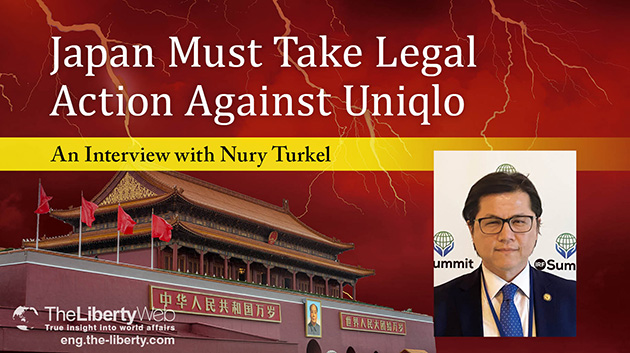Japan Must Take Legal Action Against Uniqlo
An Interview with Nury Turkel
Mr. Nury Turkel speaks at the 2021 International Religious Freedom Summit.
A major focus of this year’s International Religious Freedom Summit was the issue of genocide against the Uyghurs in the Xinjiang Uyghur Autonomous Region. The Liberty spoke with a Uyghur lawyer and a speaker of this year’s Summit.
Interviewer: Satoshi Nishihata
Nury Turkel
Vice Chair of the U.S. Commission on International Religious Freedom (USCIRF)>
Mr. Nury Turkel was born in a reeducation camp during the Cultural Revolution. Mr. Turkel was granted asylum after visiting the U.S. in 1995 as a student. He is a senior fellow at the Hudson Institute. He is also the Vice-Chair at the U.S. Commission on International Religious Freedom. He was named one of the 100 most influential people in the world by the Time magazine in 2020.
Q: Please tell us about the state of detention camps in the Xinjiang Uyghur Autonomous Region.
Turkel: Historically, at the height of the Nazi operation during the Holocaust, the highest number of people they detained in the concentration camps was about 750,000. The current camp numbers have way exceeded. The District of Columbia of the [U.S.] capital has about 700,000 people. So even if it’s just one million [Uyghurs detained], it’s more than the population in Washington D.C.
Also, the number of concentration camps that [the Chinese government] has built is over 1,200. A young Chinese student in British Columbia in Canada used satellite images to identify camps. A German scholar named Adrian Zenz identified some. Also, the Austrian Policy Institute has done their own self-reports. Adding those altogether, there were over 1,200 camps identified.
There are four levels of concentration camps. One, it’s an actual prison camp where they send people after transforming them, human engineering them in the concentration camps. It’s a prison. Any random individual would get 10- to 15-year imprisonment in those camps.
The second type is a concentration camp that the international community knows, and which shares a lot of commonality with the ones in Dachau and Auschwitz. Then, the third is the forced labor camps where all the cheap products have been made. 83 global brands including Muji and Uniqlo have been implicated in this.
The fourth is the most heartbreaking. At least 800,000 children have been locked up in children’s orphanages. Forcibly removed from their families. They are believed to be children of detained parents. The United States government used that as one of the key reasons to make the genocide determination. In a genocide determination, there are four criteria and at least three of them are met in the Uyghur case. [The U.S. government] targeted deliberate prevention of population growth and targeting the children.
The world has not seen anything like this since the Holocaust. There are survivors, but China is using diplomatic pressure to forcibly bring Uyghur refugees back to China. For example, Egypt, Pakistan, Saudi Arabia, the United Arab Emirates and Cambodia have track records of baiting the Chinese government to repatriate the refugees.
Q: Do you have any information about what’s going on in the strictest concentration camps?
Turkel: You will not know what’s really happening inside the camps. Hitler didn’t show what was happening when he was gassing the Jewish people. You only know about it once the crime is completed. So, we cannot know what is happening real-time. We can only use the information that we’ve been provided by camp survivors and amazingly, the stories being told by camp survivors are collaborating. They’re consistent with each other’s stories.
Japan Should Demonstrate Leadership
Q: Japan is the only country in G7 which hasn’t imposed a sanction on China. What is your take on Japan’s stance?
Turkel: Japan does not have an interventionist foreign policy, but the danger facing Japan is real. The Japanese government needs to draw a line in the sand that says “stop”. I haven’t seen it. The Japanese government, the prime minister and all the politicians are still dancing around the issue. You have to stand firm [against China]. The recent position by the Japanese government saying that they will join the force if Taiwan is attacked is a good one.
Japan should have a Magnitsky-sanction-like measure. (Note: Magnitsky sanctions impose sanctions such as immigration bans and asset freezing on individuals and groups involved in human rights violations abroad.) The Japanese people can do it. Japan is not a large country but it’s an important country. It’s a democracy. There’s a lot that Japan can show to people, that democracy does work in Asia. We need to see more leadership [from Japan].
Q: How do you feel about Japanese companies that monetize cotton produced in Uyghur concentration camps?
Turkel: The Japanese government needs to step up and put in place legal measures against companies like Uniqlo.
When you look back at Nazi history, after the second World War during the Nuremberg trials, certain German industries stood on trial. If 83 global companies are aiding the Chinese in the ongoing genocide, this is a huge global problem.



















